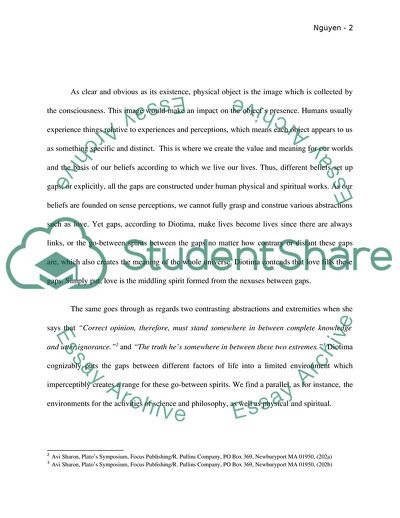
- Home
- Free Samples
- Premium Essays
- Editing Services
- Extra Tools
- Essay Writing Help
- About Us
- Studentshare
- Subjects
- Miscellaneous
- Socrate's love is a middling spirit
Socrate's love is a middling spirit - Essay Example

- Subject: Miscellaneous
- Type: Essay
- Level: Undergraduate
- Pages: 4 (1000 words)
- Downloads: 0
- Author: ubaldogreenfeld
Extract of sample "Socrate's love is a middling spirit"
In this paper, I would like to explain the Socrates’/Diotima’s assertion of love: That it fills the gap between what is heavenly and earthly and that love belongs to the absolute universe. Diotima’s concept of love is recounted by Socrates during a banquet which celebrated Agathon’s triumph at the contest in Dionysis in Athens. Socrates, Diotima’s student, relates this contention to the partygoers in the banquet. According to Socrates, Diotima asserts that love, or the middling spirit of nature, fills the gaps between humans and spirits and between two extreme concepts such as beauty and ugliness or in our dreams and conscious moments.
Diotima once explicates to Socrates “They fill up the space between heaven and earth and help bind the whole universe together, enabling gods and men to connect. … In fact, the only communication between us and the immortals, whether in dreams or awake, is made possible by these go-between spirits.”1 This suggests that love is a middle ground, a great spirit, which is a medium between humans and gods or spirits and our means to connect to what is intangible or spiritual. As clear and obvious as its existence, physical object is the image which is collected by the consciousness.
This image would make an impact on the object’s presence. Humans usually experience things relative to experiences and perceptions, which means each object appears to us as something specific and distinct. This is where we create the value and meaning for our worlds and the basis of our beliefs according to which we live our lives. Thus, different beliefs set up gaps, or explicitly, all the gaps are constructed under human physical and spiritual works. As our beliefs are founded on sense perceptions, we cannot fully grasp and construe various abstractions such as love.
Yet gaps, according to Diotima, make lives become
...Download file to see next pages Read MoreCHECK THESE SAMPLES OF Socrate's love is a middling spirit
The Immortality of the Soul
Socrates Defense of Athenian Law
Explain why Simmias and Cebes are so afraid of death in the phaedo, whereas Socrates is not. Does Socrates' explanation convince you, or are you, like simmias a
Socrates and Meletus reagrading Socrate's trial
Jewish Influence in the Works of Woody Allen
Socrates Argument on Love
Supporting Civil Disobedience in the Society
Jewish Humor in the Works of a Writer, Director, and Comedian Woody Allen

- TERMS & CONDITIONS
- PRIVACY POLICY
- COOKIES POLICY